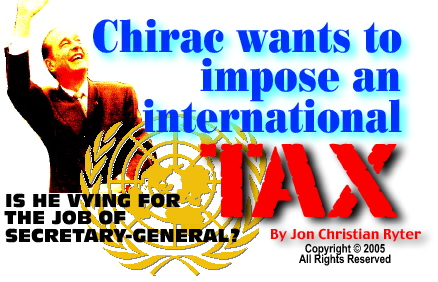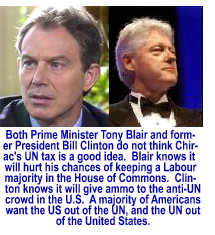
News
Behind the Headlines
Two-Cents Worth
Video of the Week
News Blurbs
Articles
Testimony
Bible Questions
Internet Articles (2015)
Internet Articles (2014)
Internet
Articles (2013)
Internet Articles (2012)
Internet Articles (2011)
Internet Articles (2010)
Internet Articles
(2009)
Internet Articles (2008)
Internet Articles (2007)
Internet Articles (2006)
Internet Articles (2005)
Internet Articles (2004)
Internet Articles (2003)
Internet Articles (2002)
Internet Articles (2001)


 rench
president Jacques Chirac floated the idea of imposing
a $10 billion international tax to fund additional research
on AIDS at the World Economic Forum
in Davos, Switzerland, as well as an education program that
Chirac insists will half new cases of HIV. "Today,"
Chirac said in a prepared endorsement of what he declared
would be an "experimental" tax (since, by its own
charter, the United Nations is forbidden from taxing
anyone), "I propose to forge ahead by creating an
experimental levy to finance the fight against AIDS."
rench
president Jacques Chirac floated the idea of imposing
a $10 billion international tax to fund additional research
on AIDS at the World Economic Forum
in Davos, Switzerland, as well as an education program that
Chirac insists will half new cases of HIV. "Today,"
Chirac said in a prepared endorsement of what he declared
would be an "experimental" tax (since, by its own
charter, the United Nations is forbidden from taxing
anyone), "I propose to forge ahead by creating an
experimental levy to finance the fight against AIDS."
 Chirac
addressed a crowd of world business leaders, global politicians
and celebrities. Attending the meeting in Davos was former
President Bill Clinton who was just named by UN
Secretary Kofi Annan as the "tsunami envoy"—the
UN's point man on tsunami reconstruction. The status as special
envoy of the Secretary-General is a plum that will look well
on Clinton's resume as the former president vies for
the office of Secretary-General although, under the terms
of the UN Charter, national leaders are forbidden from
from heading the global organization. Clinton, like
Chirac, is technically ineligible to seek the job.but,
nevertheless, both appear to be actively "campaigning"
for tje job when Kofi Annan's term in office expires.
(It appears that arachic 1945 "rules" don't apply
to the global government-in-waiting in the opening days of
the 21st century.
Chirac
addressed a crowd of world business leaders, global politicians
and celebrities. Attending the meeting in Davos was former
President Bill Clinton who was just named by UN
Secretary Kofi Annan as the "tsunami envoy"—the
UN's point man on tsunami reconstruction. The status as special
envoy of the Secretary-General is a plum that will look well
on Clinton's resume as the former president vies for
the office of Secretary-General although, under the terms
of the UN Charter, national leaders are forbidden from
from heading the global organization. Clinton, like
Chirac, is technically ineligible to seek the job.but,
nevertheless, both appear to be actively "campaigning"
for tje job when Kofi Annan's term in office expires.
(It appears that arachic 1945 "rules" don't apply
to the global government-in-waiting in the opening days of
the 21st century.
Chirac noted that the money could be raised by one of several methods—including a tax on international financial transactions; a special levy on currency trades, a tax on the fuels used by airlines for international flights; or by taxing the fuels used by sea-going vessels that travel the international waterways of the world. Not specifically mentioned by Chirac—but the method of taxation that would most likely be implemented once the right to tax is approved —would be a one-day tax on the wages of the workers in the wealthy nations, assessed and collected by that nation's government, and surrendered to the UN with the funds that nation normally contributes to the upkeep on the UN.
Chirac's proposal came at the moment that the World Heath Organization is attempting introduce an antiretroviral therapy [ARV] program. (Antiretroviral drug therapy inhibit the replication of HIV by slowing the process down and delaying the advent of each new phase of the disease. It is not a cure.)
 In
2002 Ann Sheehy, a postdoctoral fellow working as a
Senior Research Associate in the Department of Infectious
Diseases at King's College in London, isolated an anti-HIV
protein in human DNA. The protein has been named APOBEC3G.
Although the precise function of APOBEC4G is unknown, it appears
the protein protects cells from viruses by altering their
geonome. The alterations performed by APOBEC4G is so radical
that the virus can't survive. Sheehy spent 10 years
examining two DNA strands that differed by only 200 genes.
Even after she narrowed it down to 10 strands, it still took
three years to find the correct gene. Once she identified
the gene, scientists were then able to identify the specific
protein that could be used to attack HIV-4.
In
2002 Ann Sheehy, a postdoctoral fellow working as a
Senior Research Associate in the Department of Infectious
Diseases at King's College in London, isolated an anti-HIV
protein in human DNA. The protein has been named APOBEC3G.
Although the precise function of APOBEC4G is unknown, it appears
the protein protects cells from viruses by altering their
geonome. The alterations performed by APOBEC4G is so radical
that the virus can't survive. Sheehy spent 10 years
examining two DNA strands that differed by only 200 genes.
Even after she narrowed it down to 10 strands, it still took
three years to find the correct gene. Once she identified
the gene, scientists were then able to identify the specific
protein that could be used to attack HIV-4.
While Sheehy's discovery is improving the quality of life of the AIDS patient it does not, as yet,offer either a cure or a vaccine that will prevent the disease. None of the AIDS drugs developed to date will prevent or cure AIDS. Nor will they keep the HIV-positive patient from dying. The new generation of AIDS-fighting drugs simply prolong the life of the infected person by slowing down the progression of the disease. But everyone who becomes HIV-positive will ultimately get full-blown AIDS—and everyone who gets AIDS will ultimately die a horrible death as a result of it—whether they succumb to the disease itself or die from one of the immune deficiency diseases that develop as a direct result of AIDS.
Because
the United Nations Charter precludes the UN
from imposing any type of tax whatsoever, the media asked
U.S. Treasury spokesman Tony Fratto what President
George W. Bush thought about Chirac's idea of
creating what would amount to as a world tax. Fratto
responded that "...[t]he United States is not inclined
to support international taxation schemes."
British Prime
Minister Tony Blair, who is fighting an uphill battle
to keep his Labour Party majority in the Parliament and, at
the same time, to boost his own popularity within the Labour
Party and among the British citizens, was asked a similar
question. Blair responded that he had not studied
Chirac's proposal, but felt it was necessary to leave
all of the options on the table. The simple truth is,
England, France and Germany, like the United States, are suffering
tremendously from the affects of globalization. Adding a $10
billion global tax—that will be assessed only on the
wealthiest 22 nations—to fight AIDS on top of another
proposed increase in the levies paid by the wealthiest nations
that will amount to over $125 billion more per year by the
end of this decade goes beyond the pale. Particularly since
the economies of the developed nations are rapidly shrinking
as the jobs drain continues.  In
fact, when the Kyoto Protocol goes into affect next
week, the jobs drain will intensify as the industrial nations
are required to meet even stiffer environmental regulations
under the climate change treaty
In
fact, when the Kyoto Protocol goes into affect next
week, the jobs drain will intensify as the industrial nations
are required to meet even stiffer environmental regulations
under the climate change treaty
Most of the politicians present were skeptical that Chirac would be able to generate enough support from the international community to push such an unpopular—and illegal—tax through. One of those who was skeptical Chirac's idea would get off the ground was Bill Clinton, since he knows first hand the reaction of the American people to a UN tax since most Americans not only want the United States out of the UN, they want the UN out of the United States. (Which is one reason the UN hierarchy is working to change the rule that currently disallows a current or former national leaders from serving as UN leader. Clinton is viewed by the socialist European Union as a very popular two-term American president whose election as head of the UN would, they believe, do much to make the American people believe the UN really was an American institution created by FDR and Winston Churchill when in fact it is the evil stepchild of the League of Nations, conceived by the fornication of European and American bankers who climbed into bed with Woodrow Wilson.
Clinton
wisely suggested that Chirac forget his tax, since
it is too divisive. "It seems to me," Clinton
told the gathering at Davos, "we don't want to get
diverted into debating [a tax for AIDS research],"
adding that any discussion of that type would drive a wedge
into the conference and likely would not attract widespread
support from the international communities.
Ian Vasquez, Director of Global Economic Liberty at the libertarian Washington, DC think tank Cato Institute agreed with Bill Clinton. "I think [Chirac's] proposed tax] is reckless," he said. "International organizations already have a problem with accountability, and giving them a constant stream of revenue would make them less accountable than they already are. It seems like [Chirac] is just creating headlines for himself." It could very well be that, with the rules relaxed about current or former leaders serving as Secretary-general of the UN, Chirac may be putting himself up as an alternative to Clinton. G-8 leaders are considering several proposals to help Africa, which is the most AIDS-infected continent in the world. Sub-Sahara Africa is the poorest region in the world, with 70% of its population living on less than $2 a day. While the World Health Organization [WHO] projects that one million people in that region will die from malaria this year, they also estimate that well over two million will die from AIDS. That region received $26 billion in net aid in 2003 (the last year with complete figures). Over half of that money— $16.25 billion—came from the United States. Aid agencies have been imploring the United States (which gives less of its GNP in relief aid than any other industrial nations) to double its spending—particularly in Africa, and specifically to fight AIDS. But Chirac's radical rethinking of AIDS research, treatment and education spending is meeting strong opposition in the United States and the other industrial nations that are expected, by the UN and WHO, to shoulder 100% of the cost. The UN insists the additional funds are needed since they are now treating 75% more people than they did in 2003—and 700 thousand patients in Africa are now getting antiretroviral therapy, up from 440 thousand six months ago.
But the furor that has ignited even more negative feelings for the UN in the United States is not the request from WHO for more money, but the Chirac proposal that the UN simply take the money by imposing an international tax on the wealthiest nations.
Once
a legal precedent—an unchallenged tax—is established
through which the UN is construed to have the right
levy a tax within the invisible emprey of the UN, that
precedent will be upheld by the World Court in the
Hague and a bevy of "international taxes" will result
as the UN attempts to fund itself through the sweat
equity of the world's employed.
By the end of the next decade—if not this one—the
UN will levy a 1% income tax on all of the employed
workers throughout the world to fund its world government
(as it assures the taxpaying nations that it will never seek
more). But, since taxes are the fuels by which the engines
of government run, and because governments with the funds
to do so will always increase both their size and their need
for more tax dollars, you can expect that 1% UN tax to rapidly
rise as the globalists discover they possess the means to
fund their grandiose schemes with the sweat equity of the
world.
On January 16,
1996 the mainstream media announced that the United Nations
was "contemplating" a global surcharge on international
air travel to support its sagging coffers. Instead of demanding
to know where the UN gained its authority to tax American
travelers and American airline companies,  former
Senate Majority Leader Bob Dole [R-KS], the 1996 GOP
presidential candidate, responded by declaring that if the
UN persisted with its plan to implement a global travel
tax, the US Congress would have no alternative but to withhold
funding from the UN—suggesting by his statement
that the UN already possessed the prerogative to tax.
former
Senate Majority Leader Bob Dole [R-KS], the 1996 GOP
presidential candidate, responded by declaring that if the
UN persisted with its plan to implement a global travel
tax, the US Congress would have no alternative but to withhold
funding from the UN—suggesting by his statement
that the UN already possessed the prerogative to tax.
Where did that authority come from? Certainly not from its charter. The UN Charter was very specific in this area. Funding for the UN was to come exclusively from voluntary contributions from the member nations. That, by the way, was pretty much how the US government was funded under the Articles of Confederation. That changed with the ratification of the Constitution of the United States—our second governing charter. In that "charter," the federal government of the United States was created subservient to the State governments—just as the UN was created subservient to the nation-states that created it. The parallel is unmistakable simply because the UN—and the League of Nations before it—were deliberately created from that model.
And
just as the Federalists under Alexander Hamilton, John
Adams and John Jay loaded the federal court system
with likeminded Federalists (Jay became the first Chief
Justice of the Supreme Court), the European Union's
World Court has been loaded with likeminded globalists.
Just as the federalist judges in the first 150 years of the
United States legislatively adjudicated a supremacy for the
federal government over the States that did not constitutionally
exist, the globalists within the World Court are now
doing the same by redefining national sovereignty—granting
the nation-states the right to adjudicate internal sovereignty
issues while reserving external sovereignty issues in the
invisible emprey of internationalism (where nations collide
economically and politically), to the UN. Since this
is the UN's second attempt to legislate an international
tax, you can expect a court challenge soon. That challenge
will be heard by the World Court which will rule that not
only does the UN have the right to levy a tax to implement
the programs demanded of it by the nation-states, it has an
obligation to do so.

Copyright © 2009 Jon Christian Ryter.
All rights reserved.


